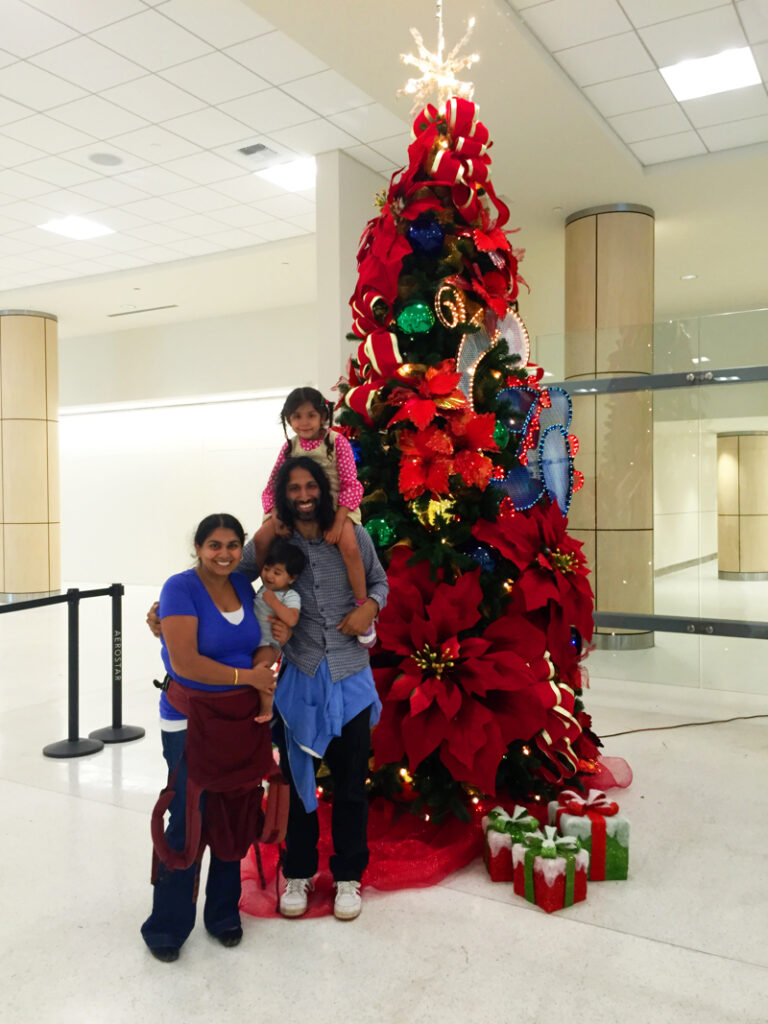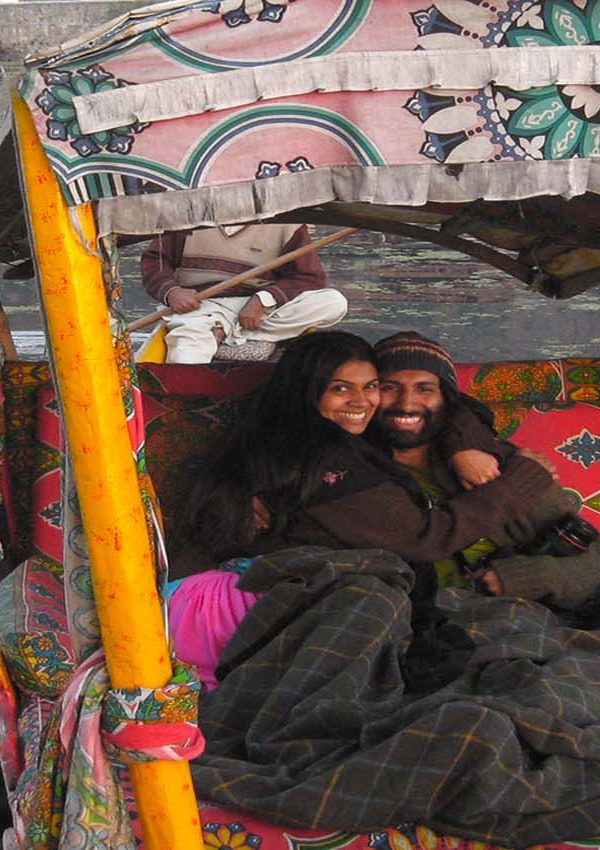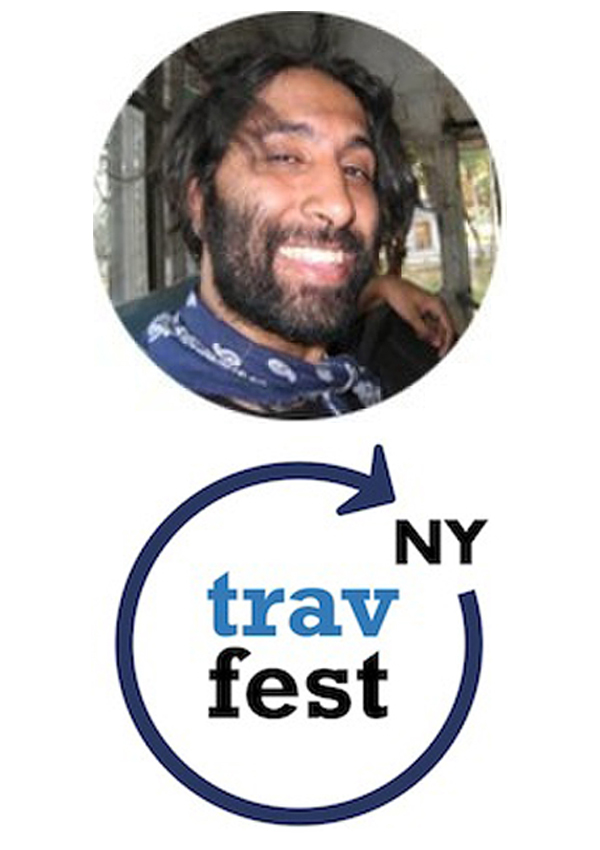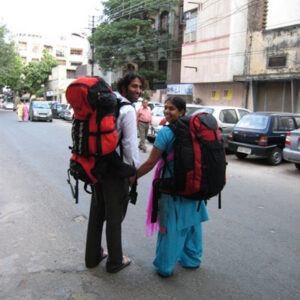
At the end of 2014, the Holy Grail of travel blogging events took place in December, the White House’s first ever Travel Blogger Summit, where 100 “influential travel bloggers” were invited to take part, some flying in all the way from Australia. That’s us up there in our formal dinner party attire in front of the elaborate White House Christmas decorations. Okay, not really. We were at San Juan airport, on our way back from celebrating Christmas on the beach in Puerto Rico. Which is pretty much like being at the White House.
From the White House:
“Last week, the Global Engagement Directorate at the National Security Council hosted a summit with 130 of the most influential travel bloggers and digital media outlets. The summit was an opportunity to discuss U.S. government initiatives and strategies for encouraging American students to study, volunteer, and work abroad.”
The senior policymakers discussed some wonderful initiatives to help increase the numbers and diversity of Americans going on these programs, particularly those from low income communities. And I love this sentiment from Denis McDonough, Chief of Staff: “Bottom line is we don’t see the cost of foreign travel or foreign study as separate or apart from the cost of college.” Hell. Yes. Funding and grants are excellent starts to creating a culture of foreign travel amongst Americans and the recent video by Obama announcing Community College will be free for everyone who wants to attend is a MONUMENTAL step in the right direction. As a college and university instructor in NYC, I see first hand the crippling effects money has on my students and how liberating it can be when they aren’t as worried about it. And as a traveler of color, it brings me joy to hear the opportunity to travel may be available on a large scale to an entire generation. Maybe the American Gap Year will be a thing in the years to come.
So, it was very disappointing that this event was organized primarily with White travel bloggers and educators in mind. Here is a link to the official video, which encapsulates everything problematic about the event. A lineup of super important White people (were ALL the important People of Color celebrating Kwanza that day?) talking to a room mostly filled with other White people (travel bloggers and educators) for a whopping 45 minutes about their plans to diversify American student travel and bring about some major changes in the culture of education. They’re speaking in code, so I’ll translate. Diversity, low income, community college, “more” Americans, “all people,” “more accessible.” They’re talking about People of Color. To People (mostly) Not of Color.
I teach creative writing in NYC, with travel writing and sometimes blogging as part of the course. My students at Borough of Manhattan Community College are as diverse as New York City, coming from all over the world. And while they love writing food and travel narratives about everything from eating Mofongo in Queens to the worst bus ride they’ve taken in Pakistan, they see travel blogging as a “White thing.” Not because that’s how it is, but because that’s how it’s being presented through the media, White travel bloggers and their participation in thoroughly White “best travel blogs” lists and panels and conferences. People of Color aren’t supposed to want to travel or write about travel. Or for that matter see themselves in books, or on TV or movies or advertisements. If there’s an alien invasion this year, boy are the aliens going to be surprised at all the People of Color.
There were some travel bloggers of color in attendance. If you squint, you can see tiny specks of brown in the stark Whiteness of the group photos. In Hostelling International’s own words: “the bloggers were largely handpicked by HI-USA.” Awesome. This inherent racism is of course not something exclusive to Hostelling International or the White House or TBEX or AWP or Book Con, or any other conference. It’s standard protocol of how well-intentioned White people organize things: all White-male panel on Children’s Literature at Book Con (which blew up in their faces and began the movement, WeNeedDiverseBooks), all-White travel and food blogging panels at AWP, the ubiquitous Whiteness of TBEX. List after list, including some using highly complex algorithms and Alexa scores, which should just be titled Top 100 White Travel Blogs or Top 50 White Travel Blogs.
And all of these things help re-enforce the notion that people of color don’t travel, or write, or draw in high traffic on their travel blogs. Which of course is total bullshit and a wholly constructed reality. Nobody travels more than People of Color. Just ask the Nomadness Travel Movement with 8000 members, all POC, from across the globe.
I also wrote a list using a special “race-neutral” algorithm and somehow ended up with with Ten Awesome Narrative Travel Bloggers of Color and there are plenty, plenty more. The travel bloggers who attended the Summit have written posts on Christmas decorations, the benefits of studying abroad, travel pieces on the White House, but only two posts written on the lack of diversity. I get it. Nobody wants to risk sabotaging relationships and potential sources of revenue by doing the right thing. There’s branding to think about. And who, in their right minds, would criticize the first and only event travel bloggers have ever been invited to at the White House? These two badasses that’s who: badass #1, badass #2. Nothing kills the sexiness of a fun travel blog like using highly charged terms like Racism, White Privilege, or White Supremacy.
Racism. White Privilege. White Supremacy.
Enter The Whiteness
Let’s start with books. Paper ones. Specifically travel narratives. Of the Top 87 “greatest travel books of all time,” or 100 or 10 or 25 or whatever arbitrary number is being used, it is very rare to see a writer of color in the midst of all the White voices. Sometimes V.S. Naipaul will be on the list, but not other well known novelists who’ve also written travel narratives, like Michael Ondaatje, Vikram Seth, or Zora Neale Hurston. Lists with straight up travel writers might mention Pico Iyer, but never Hector Garcia, Mungo Park, or countless others whose voices are drowned out and not regularly stocked in bookshelves. Here’s a wonderful list by my friend and fellow VONA alum, Bani Amor wrote: Top Ten Travel Books by People of Color.
Whiteness has very little to do with white people as individuals. It has everything to do with the System that houses it all, making sure minority voices are all but invisible. White, as a color, means nothing. The list changes every few decades of who gets to be in the club and who stays outside, hoping to get past the velvet ropes. Not that long ago the Irish, Italians, Poles, Jewish people, Russians, and heaps of folks that were put into the category of “you people,” weren’t considered White. Now they’re all in the club. Fun fact: a pivotal case from 1923 centers on Bhagat Thind, a Sikh Ph.D student at U.C. Berkeley, who argued that high caste Indians should be let into the White club so they could receive the same privileges of being White in America. It was denied of course, because while the judge admitted Indians were Aryan and therefore Caucasian, they still don’t fit the “popular” definition of the term. Now we’re not supposed to refer to White people at all because they’re the default image of a human being.
Systematic Racism. Racism that isn’t really considered racism because nice, well intentioned White people are involved in organizations, where nobody sees race (I’m COLORBLIND, yo!). Nobody at these events comes out with a red marker (I hope) and says, “remove all the travel bloggers of color from this list.” Travel bloggers of color aren’t ever on the list, or considered to be part of the conversation in any meaningful capacity. If they’re considered, it’s usually as an afterthought or as tokens.
It is absolute fantasy to think that backpacking through India, studying in Italy for a semester abroad, or teaching ESL in China can be a shared experience, pretending that gender, sexual orientation, disability, or race don’t matter. Travel is not the great unifier. All of these things play a pivotal role in how we experience a place. Although POC do have shared experiences under White systems of oppression, our individual and collective experiences are very diverse. Black people traveling to brown countries aren’t going to be met with warm hugs because all POC are friends and have one collective history you all probably learned about in your World History course.
Traveling (and teaching) while Brown presents its own challenges that I quickly found out about during my first solo trip to South East Asia and was promptly fired from my first ESL job in Sichuan Province, China for not “looking” like I spoke English. I had the Visa, contract, numerous email confirmations, and was taken out to a fancy dinner. Countless teacher-travelers of color all have similar stories. Black travelers, however, bear the brunt, especially in India. And the weirdness of being Black in Asia is that you can be a celebrity with crowds being friendly and wanting to take photos of you, touch your hair, compare their light skin with yours, to the potential for blatant racism with police harassment and being denied accommodation because of “safety.” The unifying factor in all of these stories is the outrage felt by our White colleagues and fellow White travelers. They are outraged by the blatant racism of a fellow traveler being denied a hotel room, or entry into a restaurant. But this outrage stops short of actually doing something, or not benefitting from their glamorous White skin. In my case, nobody even complained.
White supremacy is still sharply felt all over the world, even in places without White people present. Try buying skin cream anywhere in South East Asia without skin whitening bleach (a 4.3 million dollar industry in India alone). Or find a T.V. or movie star or model in a magazine with complexions that remotely look like people in the streets. And English, man, English is King, a signifier of high class, upward mobility, where it’s a sign of prestige that kids don’t read, write, sometimes not even speaking their native tongue in favor of English.
The 100 influential bloggers on the list compiled by Hostelling International are wonderful writers with social sway, but they represent a fraction of actual travel bloggers out there. These are adventurous folks who have taken travel blogging to full on rockstar levels with a lot of hard work. But there is a lot of unchecked privilege here. Frequent all-White press trips, tweetups in brown countries often exclusively with other White travel bloggers. Entitled language without acknowledging the entitlement.
Here’s a passage from Martin Luther King’s “Letter from a Birmingham Jail” that sums everything I want say:
Over the past few years I have been gravely disappointed with the white moderate. I have almost reached the regrettable conclusion that the Negro’s great stumbling block in his stride toward freedom is not the White Citizen’s Counciler or the Ku Klux Klanner, but the white moderate, who is more devoted to “order” than to justice; who prefers a negative peace which is the absence of tension to a positive peace which is the presence of justice; who constantly says: “I agree with you in the goal you seek, but I cannot agree with your methods of direct action”; who paternalistically believes he can set the timetable for another man’s freedom; who lives by a mythical concept of time and who constantly advises the Negro to wait for a “more convenient season.”







Hey there! Thanks for writing this. I’ll be linking to it.
Thanks! Let us know when you do @ishqinabackpack
Also we’re both in NYC and have kids! Well, I just have one….
Wonderful to hear you’re also in NYC, and you’re a FOODIE. A kindred spirit, girl. A year ago, we also had, “just one.” We’re still getting used to it. We should meet up once this NYC weather stops having an identity crisis and gets on with Spring.
This is beautifully written. I love how you’ve offered specific examples of, for example, authors of color who have written travel narratives (from Zora Neale Hurston to Nomadness, to your students), because it definitively shuts down the argument, “Well, there are no travel writers of color to invite/include.” Oh, but there are!
It makes me happy, picturing the image you painted of your students, “as diverse as New York City,” all traveling and writing. I hope that by opening up this dialogue on race, these students (and others like them around the world) will at last be heard and celebrated.
Much appreciated, Lillie. We’ve been reading your blog for many years and love the balance of travel advice (the Puerto Rico one was particularly helpful in planning our trip over Christmas!), with approaching territory most travel bloggers would rather gloss over, like race (and they do gloss this over). The odds of this post affecting any change are minimal at best, but it’s one voice in a sea of many and hopefully when enough people start making some noise, and make lists more inclusive, travel will look like our classrooms.
Fascinating event … my question what is the next stage? Are there follow-up events? For those who write about study abroad programs, where do we go if with questions about formal AND informal educational travel programs?
Great points. Great post. And, FYI, the only skin moisturizer I could find in Southeast Asia without scary whiteners in it was Nivea. Swore by it for for years while backpacking through the region. As a side note, in Southeast Asia it was also sometimes weird/noteworthy/cause for inappropriate touching f hair to be a blonde chick too.
Thanks for commenting, Eric and Karen. Love the journey you guys are on, and you’re absolutely right about the double-edged sword of being White in these places. If you have blonde hair you’re revered as ambassadors of Whiteness, but also bear the brunt of being the ultimate center of attention, which can lead to constant harassment and completely unwarranted sexual attention that can easily turn to aggression. We’ll be on the lookout for Nivea next time we travel.
Wow. I loved this so much. Sadly I want to see more white writers writing things like this, and I don’t see much of it. I don’t even see white travel writers sharing these kinds of discussions on social media platforms. The few I do see are just a handful.
I’m not sure you know Tracie Powell of AllDigitocracy? She’s creating a discussion on the lack of poc narratives in mainstream travel pubs and lists. I really think you connect with her. She’s in New York, and her website is fantastic.
Also, I should mention I’m huge Bani Amor fan and supporter and wonderer (she gets so much done!) and the reason I found this piece was because of your link to her. I loved her piece as well, and I’m sure it was hard to limit it just to ten!
xxoo AGA
Thank you. I’m also a massive Bani Amor fan! This is a very complex issue to tackle and White people don’t write about it because that would mean admitting they are participating in a racist system and are privileged by it. Nobody wants to do that. I’m not sure who Tracie Powell is, but will definitely reach out to her. Thanks!
Great post, so great!
Thanks, Jon!
Do you feel the same biases exists between gender differences? For example, are white female travelers favoured over their male counterparts, who are then favoured over POC?
Your article hit home because I’ve met many aspiring travelers from South Asia who see travel as an unattainable ambition. Because of few popular(ized) POC role models, they seem to associate RTW trips and professions such as travel journalism with a certain prestige that can only be attributed to westerners. While ethnically I am South Asian, and I speak the language, many of South Asian say, ‘well you’re Canadian, it’s not the same thing.’
Building upon the words of Martin Luther King, I feel that, us, ‘moderate Asians or POC’ should put our heads together and find ways to build bridges and empower individuals of similar background.
An oversimplified response to your question is this: males are always privileged in the System. The idea of travel being a White or “Western” thing is the result of silencing voices. Our “Western” passports certainly carry privilege and the bridge building to empower folks has to start somewhere. Moderate Asians and POC, unfortunately, don’t have any systemic power, unless they establish a capitalist presence in the travel industry. Keep up the good work on what looks like an incredible trip, Arooj. Looking forward to reading more!
Thank you for the push (gentle smack maybe) to write a bit more honestly about my travels as a white chick. My blog was never gonna be sexy anyways, sigh…
I’ve been a lazy, half-hearted participant in the blogging community, since it often seems more like an icky “like” exchange than a thoughtful thought exchange, and also because I mostly write for myself and my dear seven readers (most of whom are white). I didn’t even know there were blogging panels! And at the White House! wow. But this post and the (very long) Diverse Voices discussion (whew!) and other blogs that you’ve linked to make me want to pay more attention.
I just linked to this post on my blog, hope that’s ok. You inspired me to update my About page with some self-identifiers that had been nagging at me. I look forward to reading more of your stuff! I think your attitude and writing are really encouraging and funny.
Thank you for the lovely comments, Donna. By the way, really like the photos on your site. I wouldn’t get too caught up in the like factors and definitely don’t do like exchanges, or your only readers will be other bloggers. It’s great that you’re evaluating how you write about a place. White supremacy is something we’re all complicit in playing a role in for the system to work, including People of Color. This is not about individual white people, but the system that houses it all. Looking forward to reading more of your posts!
This piece was on point. As a postcolonial, brown, female “travel blogger”, I too am fed up of reading travel blogs written by Caucasian travel bloggers who perceive the world with their myopic, culturally insensitive lenses. I’m so glad I discovered your work. Keep it up!
Thanks, Suzanne!
I came across this article from the interview share on your FB today (which I will share once I’m finished writing this comment). This is a wonderfully written article that illustrates one of the things that irks me most about the many, many travel bloggers that I follow: the articulation of ‘If I can travel this easily, then everybody can’ that is constantly followed up by a slew of ‘I am not lucky to travel like this – I just worked hard’ posts. I think the way that you expressed this notion is better than the way I can – “These are adventurous folks who have taken travel blogging to full on rockstar levels with a lot of hard work. But there is a lot of unchecked privilege here.”
I wish that more white travel bloggers would acknowledge that they are damn lucky to do what they do. Of course they have worked hard, and that influences their success, but they were given a huge head start to begin with. I recently travelled with two friends from India (not travel bloggers) and the process that they underwent just to get a 2 week visa to enter Europe gave me a massive wake-up call. They had to submit an endless ream of paperwork, undergo phone ‘interviews’, and I had to write a letter of invite saying that I had planned their trip and made all of their bookings. They said that many of their friends have been denied visas for Europe or the US. These are people from wealthy families, so I imagine the chances of being granted a visa are much slimmer for the less privileged.
Sorry for the lengthy comment. I enjoy reading your blog and will be sharing this post. Happy travels 🙂
Yes. Yes. So much yes. Love this post!